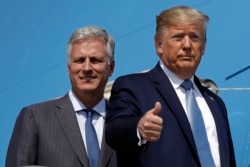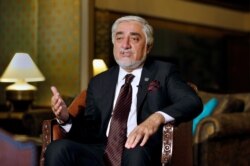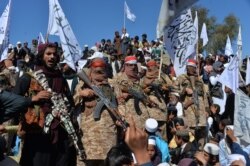The Taliban says U.S. President Donald Trump's intention to withdraw all American troops from Afghanistan before the end of the year will bode well for the peace deal between the two adversaries.
Trump suggested on Twitter late Wednesday a withdrawal timeline as early as Christmas, a deadline much sooner than that put forward by his national security adviser, Robert O'Brien, earlier in the day.
"We should have the small remaining number of our BRAVE Men and Women serving in Afghanistan home by Christmas!" Trump tweeted.
The Taliban hailed the announcement as "a positive step" on the way to implementing the peace deal it signed with the United States on February 29 aimed at ending the 19-year-old Afghan war.
"The Islamic Emirate (Taliban) is also committed to the contents of the agreement and hopes for good and positive relations with all countries, including the U.S., in the future," a Taliban statement said Thursday.
Trump's tweet came hours after O'Brien had said the administration intends to reduce U.S. troop levels in Afghanistan from 5,000 to 2,500 by early 2021.
Afghan government
The Afghan government, which was not part of the U.S.-Taliban deal, did not immediately offer any direct reaction to Trump's tweet.
However, Afghan army chief General Yasin Zia told reporters Thursday that in the past six months, local security forces have conducted all ground operations against insurgents across Afghanistan.
Abdullah Abdullah, the head of the Afghan government's peacemaking process, told reporters during his ongoing visit to India that it was early for an official response to Trump's statement.
"But eventually we as Afghans should be prepared for any eventuality. There is no doubt that there will be consequences by the decisions made by (our) international partners all together. But it is our responsibility to work together and find a way to live in peace," Abdullah stressed.
U.S.-Taliban deal
A U.S.-led international military alliance invaded Afghanistan days after the deadly Sept. 11, 2001, attacks on New York and Washington.
The military action toppled the then-ruling Taliban for harboring the al-Qaida terror network and its chief, Osama bin Laden, the mastermind of the terror strikes on America.
The Taliban, however, has since waged a relentless and bloody insurgency against the U.S.-backed government in Kabul, regaining control or influence over half of the country's districts, though Afghan officials contest those claims.
The U.S.-Taliban deal called for the removal of all foreign forces from Afghanistan by mid-2021 in return for assurances by the insurgents to ban terrorist groups from using Afghan soil for international attacks.
The deal also encouraged the insurgents to open first-ever direct peace talks with the Afghan government last month in Doha, Qatar, to negotiate a permanent cease-fire and power-sharing deal in post-war Afghanistan.
The intra-Afghan dialogue, however, has not produced any tangible outcome more than a month after it started.
Taliban violence
The Taliban has refused to reduce battlefield violence in Afghanistan despite engaging in peace talks in Doha. Critics say Trump's latest troop withdrawal tweet would embolden the insurgents and would weaken the Afghan government negotiating team.
"And it kneecaps U.S. envoys and other officials by seriously undermining their claims that any further troop reductions would be 'conditional.' Or, Trump's statement suggests that the only condition that concerns him is what he thinks sounds good on the eve of election," tweeted Laurel Miller, a former U.S. government special representative for Afghanistan and Pakistan.
Torek Farhadi, a Kabul-based political commentator and former government official, urged Afghan rival teams to make their ongoing peace dialogue productive instead of paying attention to Trump's actions.
"Early withdrawal of U.S. forces from Afghanistan by Christmas could tip the scale in favor of Taliban on the battlefield. But make no mistake, this war could go on much longer. Both sides should focus on peace through a political agreement. Peace is what Afghans want from their leaders," Farhadi said.
The Afghan war is estimated to have killed more than 160,000 people. They include combatants on both sides and Afghan civilians. The U.S. military has lost more than 2,400 personnel while more than 20,000 others have been wounded and the military action has cost Washington nearly $1 trillion.











